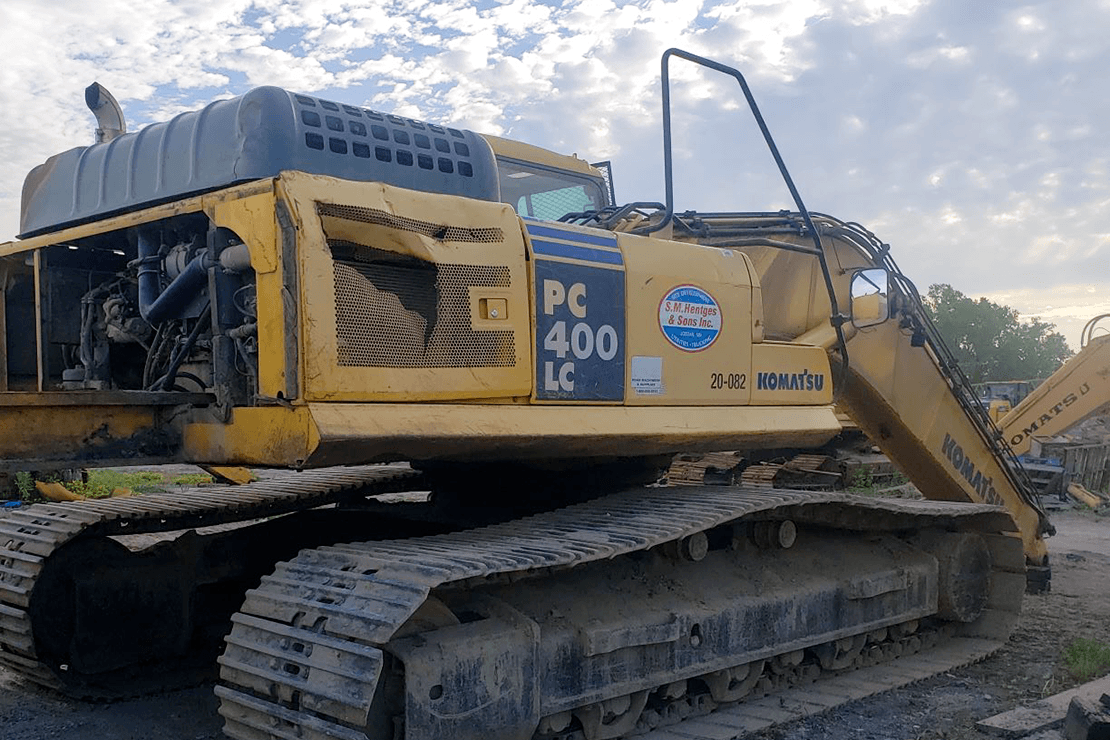S.M. Hentges & Sons in Jordan upgrade old excavators

Jordan, Minn. – S.M. Hentges & Sons recently replaced one 2005 and one 2006 Komatsu excavator with the help of Project Green Fleet, an Environmental Initiative program that replaces older, inefficient diesel engines in heavily used professional equipment, helps business owners save money, reduces diesel exhaust emissions, and protects the health of workers and neighbors.
“S.M. Hentges and Sons Inc. is proud to partner with Project Green Fleet in doing our part to lower emission levels from our fleet creating cleaner air for all to breathe,” said Jeremy Hentges, Director of Field Operations.
Diesel exhaust contains more than 40 chemicals, including 15 known cancer-causing substances. Project Green Fleet is a voluntary effort that aims to significantly reduce air pollution caused by exhaust from diesel fleets operating around the state. The program also offers financial resources to promote healthy communities and businesses through continuous air emission reductions.
“Project Green Fleet supports our environment, economy and public health through thoughtful partnerships based in the same core value – advancing the vitality of local communities,” said Alli Mueller, senior project manager at Environmental Initiative. “This one project will reduce emissions equivalent to those produced by approximately 20,700 cars, getting us closer to our goal of having clean, breathable air throughout Minnesota.”
Launched in 2005, Project Green Fleet’s initial goal was to clean up the engines in school buses across Minnesota. Environmental Initiative surpassed that goal in 2014, successfully cleaning up the engines in every eligible school bus – all 3,200 of them – across the state. Since then, Project Green Fleet has focused on working with fleet owners to retrofit or replace heavy-duty equipment in need of updated engines, increasing the overall efficiency and lifespan of the machines. We’ve currently improved performance and reduced emissions on more than 1300 engines across the state in partnership with public, private, and Tribal fleets. The project has also expanded beyond Minnesota with projects underway in Wisconsin, Washington, Florida, and Louisiana.
According to the Minnesota Pollution Control Agency (MPCA), most of the state’s air pollutants come from smaller, widespread sources that are not highly regulated. These sources include cars, trucks, construction equipment and residential garbage and wood burning.
David Benke, Resource Management and Assistance Division Director at the MPCA said “Transitioning away from older, diesel-burning engines is a critical part of our work to ensure that Minnesotans can breathe cleaner air. These efforts rely on collaboration between government, industry, and business partners, and making critical investments in environmentally responsible projects that help improve air quality and also support our state’s economy.”
“Project Green Fleet has been an extremely effective partnership that has made a measurable difference in improving air quality in Minnesota,” said Heather Rein, community relations director at Flint Hills Resources Pine Bend refinery in Rosemount. “As a longtime partner of Project Green Fleet, we are grateful to Environmental Initiative for its leadership and commitment to bringing people and organizations together to find shared solutions for our environmental challenges.”
Tony Kwilas, Director, Environmental Policy, of the Minnesota Chamber of Commerce, said, “The Chamber is proud to be a part of this effort to build community around common sense and powerful efforts to combine improved business and environmental operations.”
Jon Hunter, Senior Director, Clean Air for American Lung Association in Minnesota, also praised the effort, saying, “Protecting people’s health and improving air quality in our communities require local solutions. These kinds of partnerships are critical as we tackle the more dispersed sources of air pollution across the state.”
Funding to replace these vehicles was made possible through the Environmental Protection Agency’s Diesel Emissions Reduction Act and the national Volkswagen Settlement funds administered through the Minnesota Pollution Control Agency.
About Project Green Fleet
Project Green Fleet is an initiative of Clean Air Minnesota, a coalition of air quality leaders committed to creating healthy and thriving communities through voluntary emissions reductions. The Minnesota Chamber of Commerce and the American Lung Association of Minnesota are co-chairs of Clean Air Minnesota. Clean Air Minnesota and Project Green Fleet are managed by Environmental Initiative.
###